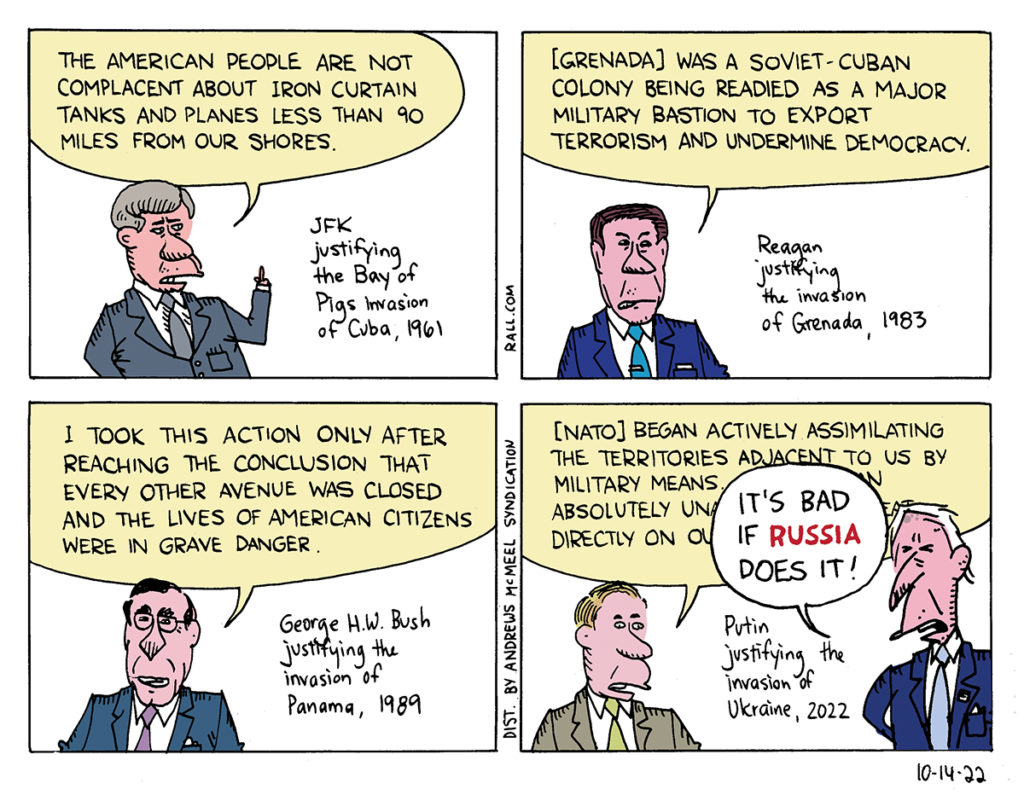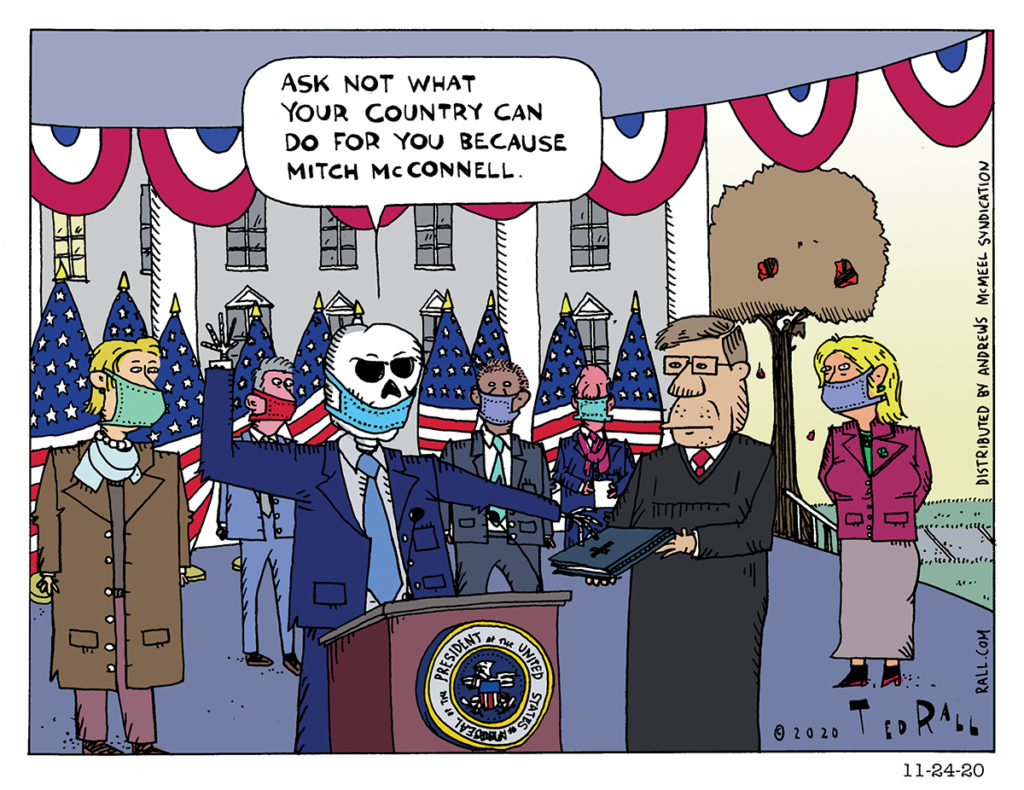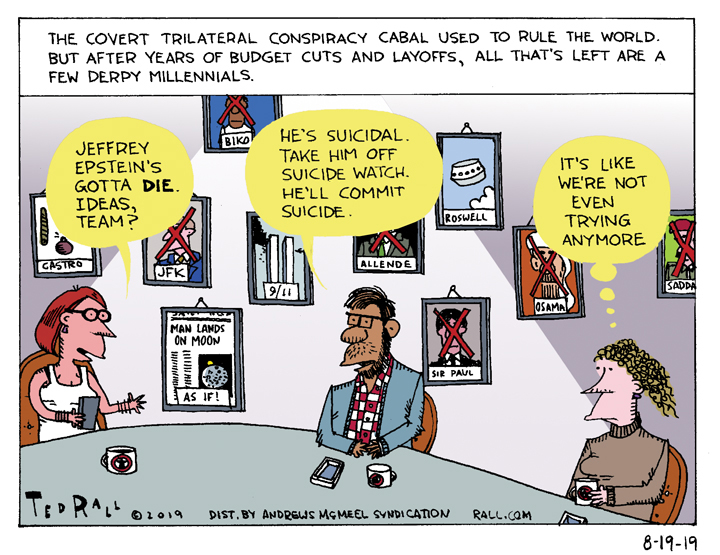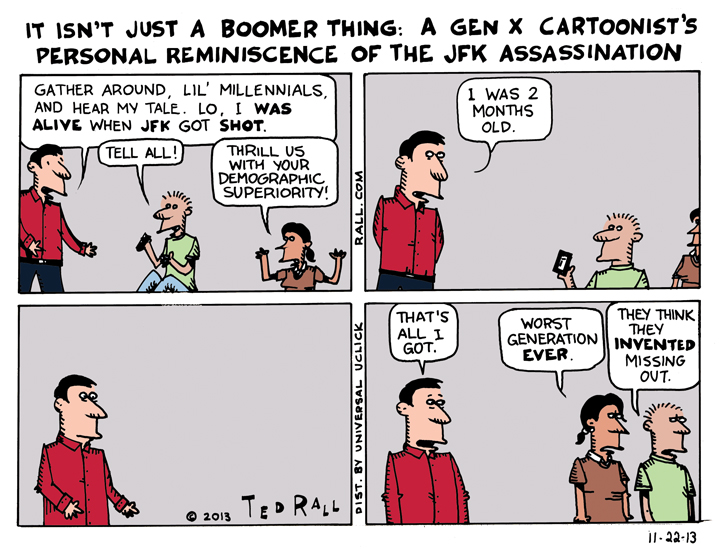On July 13th an assassin attempted to kill former President Donald Trump at a campaign rally in Butler Pennsylvania. The bullet grazed his right ear but his bravado-filled response turned out to have greatly benefited his campaign for reelection.
The Final Countdown – 4/23/24 – Flames of Dissent: Campus Unrest Amid Gaza War
 On this episode of The Final Countdown, hosts Angie Wong and Ted Rall discuss a wide array of hot topics around the globe and nationally, including the campus-wide pro-Palestine protests around the country as the Gaza War rages on.
On this episode of The Final Countdown, hosts Angie Wong and Ted Rall discuss a wide array of hot topics around the globe and nationally, including the campus-wide pro-Palestine protests around the country as the Gaza War rages on.
Invasions Are Only Bad When Russia Does Them
From the Monroe Doctrine to the ongoing blockade of Cuba, the United States has repeatedly exerted and exercised its prerogative to invade any country in its immediate region, up to and including the entire Western hemisphere, if it perceives a threat of any kind, whether real or imagined. So it’s a bit baffling that so many Americans violently deplore Russia’s invasion of Ukraine, which is right along its border, after Ukraine threatened to join NATO, an anti-Russian military alliance.
If Previous Presidents Reacted to Crises the Way Biden Is to the Covid Economic Crash
Even if Joe Biden’s proposed economic stimulus package were to pass intact, it is way too small to have an impact and truly help out. In comparison, it is less than 1/4 per capita relative to unemployment than the package that failed under Barack Obama. This is a Band-Aid on a gaping wound. And that’s before the Republicans get to it.
Our Politics Need a Culture of Atonement
Culturally informed by Roman Catholicism’s expectation that regret must prompt an apology as well as penance, Western European tradition calls for a rhetorical journey by politicians who claim to have changed course. A chastened leader should explain why and how he came to his previous belief, explain the circumstances that changed his mind and make the case for his new, different policy. He must expend political capital in order to get changes enacted.
Charles de Gaulle, who wanted France to retain control of Algeria, had observed the popularity and ferocity of the Algerian independence movement during his frequent visits to Algiers. In 1960 the French president admitted that he’d long been mistaken. “The Algerians will have the free choice of their destiny,” he informed a nation stunned by his dramatic reversal. Speaking of political capital, some military officers felt so betrayed they tried to assassinate him. But he brought the Algerian crisis in for a soft landing and regained support.
A rare American example occurred in 1987. President Ronald Reagan first denied negotiating with Iranian hostage takers. Then he apologized to the public for Iran-Contra. Taking “full responsibility for my own actions and for those of my administration,” Reagan then admitted to misleading the public. “A few months ago I told the American people I did not trade arms for hostages. My heart and my best intentions still tell me that’s true, but the facts and the evidence tell me it is not.” Reagan’s admission was a low point for his presidency but bolstered his reputation in the long run.
Atonement doesn’t play a frequent role in American politics.
Yet it works. After JFK accepted responsibility for the attempted overthrow of the Cuban government at the Bay of Pigs—he could have schluffed the fiasco off on Eisenhower, whose administration planned it—his popularity soared.
But it might not have worked for Ike. A study undertaken in 2017 in nine nations including the U.S. found that—especially in the U.S.—conservatives are less willing than liberals to apologize and that they’re less likely to accept an apology when one is offered.
Conservatives mocked Bill Clinton and Barack Obama for “apology tours” expressing regret over America’s role in the slave trade and Middle East interventionism, respectively. Being Republican means never having to say you’re sorry.
The fertile soil for a culture of atonement occurs on the left.
Joe Biden needs to unify the Democratic Party. He has the center-left Hillary Clinton wing in the bag. He leads in the polls but has an enthusiasm gap in progressives who supported Sanders and Warren. Neither Black Lives Matter nor progressives have forgiven the former vice president for supporting the police-group-written 1994 crime bill, which contributed to mass incarceration. They’re angry that he voted for war against Iraq. A fulsome apology followed by substantial atonement—the way Sanders now says he shouldn’t have voted for the war against Afghanistan—could help Biden with activists.
So far, so tepid.
Biden hasn’t expressed regret, apologized or explained his change of heart, much less promised to do better when contemplating issues of law and order or wars of choice in the future. Why should the left forgive a man who hasn’t asked for it?
Kamala Harris is on the short list for the vice presidency. Her prospects are clouded by her history as a pro-cop prosecutor. She might consider that confession is good for the soul as well as the polls—especially among the progressive Democrats Biden needs. Harris could renounce her “lock them up and throw away the key” past as a attorney general. She could urge the release of Kevin Cooper, now serving on death row for murders that he may not have committed because she opposed DNA testing. Harris said she felt “awful about this.” Never mind the pabulum. Write a check to the Innocence Project.
Empty talk won’t save organizations either.
The NFL is trying to pivot away from its long-standing prohibitions against players expressing opposition to racism and police violence, a policy symbolized by blackballing Colin Kaepernick. “We, the National Football League, admit we were wrong for not listening to NFL players earlier and encourage all to speak out and peacefully protest,” commissioner Roger Goodell said.
Goodell’s statement “has rightfully been met with skepticism from the masses,” Vincent Frank wrote at Forbes. “But if [Colin] Kaepernick remains unemployed once the 2020 NFL season starts in September, it will have been proven that Goodell’s words were nothing more than an attempt to appease the masses through a well thought out PR stunt.”
Biden, Harris and the NFL need to atone for their sins. We don’t want their words. We need action.
(Ted Rall (Twitter: @tedrall), the political cartoonist, columnist and graphic novelist, is the author of the biography “Bernie,” updated and expanded for 2020. You can support Ted’s hard-hitting political cartoons and columns and see his work first by sponsoring his work on Patreon.)
SYNDICATED COLUMN: Hillary Clinton’s Life of Crime
Bill and Hillary Clinton “earned” — can a mortal earn such stratospheric sums? — “at least $30 million over the last 16 months, mainly from giving paid speeches to corporations, banks and other organizations,” The New York Times reports. “They have now earned more than $125 million on the [lecture] circuit since leaving the White House in 2001.”
This is an important issue. But the big story has little to with what actually matters.
Coverage of the Clintons’ spectacularly lucrative speaking career has focused on how it affects Hillary’s 2016 presidential campaign — specifically the political damage caused by the public’s growing perception that Hillary is out of touch with the common man and woman. It is a promising line of inquiry for her detractors (myself included).
Hillary is out of touch. She hasn’t been behind the wheel of an automobile for nearly 20 years, is a multi-multi-millionaire who nevertheless considered herself “dead broke” and still believes that she and her husband are not among “the truly well off.” (Maybe Bill still drives.) Ostentatious wealth coupled with tonedeafness didn’t help Mitt “47%” Romney in 2012, or John “I can’t remember how many houses I own” McCain in 2008 — and they were Republicans, a party that gleefully despises the poor and jobless. For a Democrat under heavy fire from her party’s progressive base — with Elizabeth Warren, Bill di Blasio and Bernie Sanders leading the charge — this stuff could be politically fatal.
But the media ought to focus on the real issue. FDR was wealthy, yet he created the social safety net as we know it (what’s left of it, anyway). JFK and RFK came from money, yet no one doubted their commitment to help the downtrodden. Liberals distrust Hillary due to her and her husband’s long record of kowtowing to Wall Street bankers and transnational corporations, supporting jobs-killing “free trade” agreements, backing the NSA’s intrusions into our privacy, and as an unrepentant militarist. Her progressivism appears to have died with her law career.
Conflict of interest: that’s why we should be concerned about all those $250,000 speeches.
The big question is: why do corporations and banks shell out a quarter of a million dollars for a Hill Talk?
Corporations and banks don’t pay big bucks to Hillary Clinton because they’re dying to hear what she has to say. After having been front and center on the national political scene for a quarter century, she and Bill don’t have new insights to share. And even if I’m wrong — even if you’re a CEO and you’re dying to learn her ultimate (new) recipe for baking cookies — you don’t have to invite her to speak to your company to get the dish. You can ask one of your CEO pals who already had her speak at his firm — or pay to attend one of the zillions of other lectures she gives.
This is not about Hillary’s message.
Corporations and banks bribe the Clintons to buy political favors. The speaking racket is a (flimsy) cover.
Like, there’s the time Goldman Sachs paid $200,000 for a Bill Talk a few months before the financial conglomerate lobbied Hill when she was secretary of state. At least 13 companies paid Bill and Hill at least $2.5 million in similar sleazy deals.
Those are just the brazen quid pro quo deals.
Among the companies that have lined Hillary’s pockets over the last 16 months are “a mix of corporations (GE, Cisco, Deutsche Bank), medical and pharmaceutical groups (the California Medical Association and the Pharmaceutical Care Management Association), and women’s organizations like the Commercial Real Estate Women Network,” the Times says. “Mr. Clinton’s speeches included a number of talks for financial firms, including Bank of America and UBS, as well as technology companies like Microsoft and Oracle.”
GE, Cisco and Deutsche Bank aren’t run by idiots. Nor are lobbying groups like the female realtors. Their boards know that Hillary may well become president. Even if she loses, those bribes — er, speaking fees — are a smart investment in DC influence. The Clintons have strong ties at the highest levels of the Democratic Party establishment and on Wall Street. If you’re GE, it makes sense to make nice with people whose help you might want someday, so they’re likelier to pick up the phone when you call to, say, grease the skids for a merger in danger of getting derailed by antitrust laws.
Laws governing the sale of political access are relatively clear, but rarely enforced. The ethics, however, are simple: honest people don’t take money from people they may be charged with governing or regulating in the future.
“Behind every great fortune,” Balzac maintained, “lies a crime.” If there were any justice, the Clintons would be in prison for a generation of criminal activity that has left America a corrupted, Third Worldified nation, poorer for having been looted by the companies and banks whose criminality they aided and abetted.
(Ted Rall, syndicated writer and the cartoonist for The Los Angeles Times, is the author of the new critically-acclaimed book “After We Kill You, We Will Welcome You Back As Honored Guests: Unembedded in Afghanistan.” Subscribe to Ted Rall at Beacon.)
COPYRIGHT 2015 TED RALL, DISTRIBUTED BY CREATORS.COM
SYNDICATED COLUMN: Presidential Politics: All Personality, No Platform
Distributed by Creators Syndicate (click the link to purchase for publication):

Hillary Clinton has everything she needs to run for president: money, name recognition, staff, organization. Everything except ideas.
The 2016 presidential campaign will begin in earnest in late summer. This hasn’t snuck up on her; she has known this was coming since at least 2008. Yet here she is, six months before the unofficial start of her run, starting to figure out what she’ll do if she wins.
“People close to Mrs. Clinton say she has not yet settled on a specific platform” on the economy, the New York Times notes in a report about a recent series of meetings she held with 200 economists in order to collect their assessments of the economy.
There’s nothing wrong with asking experts for suggestions about how to fix the problems you want to solve. But you should already have a vision for what America and its economy ought to look like. You should be born with your platform – and, if you decide to run, collect advice from your brain trust on a granular level, concerning how to realize your goals.
If you haven’t always known what you would do if you woke up tomorrow morning as president, and whom you would appoint to help you govern, you have no business running.
Unfortunately, the former senator’s lack of ideas isn’t unique. She reflects a disturbing shift in American politics that most people haven’t noticed because it snuck up on us over time: in the past, politicians ran on a slate of ideas. Now they campaign as personalities.
Look at political buttons from a century ago. FDR ran on “prosperity” and “jobs.” They’re vague — but they’re ideas. And when he won, FDR demanded that his ideas become laws within his first 100 days. Reagan declared that it was “morning in America.” What does that mean? It’s been 35 years, he served two terms, I still don’t know. “Yes we can,” Obama promised in 2008. Can what? It worked because your mind fills in the rest, but it says nothing. “Hope.” “Change.” For/to what?
Reading the diaries of Chief of Staff HR Haldeman, I was surprised to learn that the newly-elected Nixon administration – led by this reputedly hardheaded ideological warrior – spent much of its first year, 1969, recuperating from the campaign it had just won, learning how to use the White House phone system and how to liaise with Capitol Hill before finally sitting down to determine what it actually wanted to do domestically and vis-à-vis foreign policy. I realized that, at least dating back to the 1960 race between Nixon and JFK, presidential candidates haven’t gone into it with much of a vision of how they want to change America. Their primary goal is to get the job, to add the gig to their resume, satisfied that their face may someday end up on a stamp or maybe a coin, and that schoolchildren will forever have to memorize their names.
Think back to the first year of every presidency in recent memory. None, even those like Reagan and George W. Bush who eventually oversaw radical policy changes, pushed major legislation right out of the gate – which is surprising given that a president will never have as much political capital as when he first takes the office. Stepping in during the middle of a global economic crisis, Obama never proposed anything on the economic front and handed off his Affordable Care Act to congressional Democrats throughout his first year. Since 2009 Obama has come off like a guy who achieved everything he wanted simply by having been elected. Bush’s first year was derided as aimless and policy-free until 9/11 gave him a sense of purpose. No major policy prescriptions came out of the Clinton White House for much of his first term.
2016 is once again shaping up as a clash of personalities over ideas, a high school student council-style personal popularity contest – “who would you most rather have a beer with?” (or, in Clinton’s case, are you “likeable enough“?) – as opposed to a debate over the direction of the country. Writing in the Washington Examiner, Michael Barron asks: “Can Jeb Bush — or anyone — come up with a platform for primaries, general, and presidency?”
Implicit in this question is the curious fact that none of the likely contenders for the Republican presidential nomination have yet articulated a platform. Even the most ideologically grounded GOP candidate, Rand Paul, finds himself showcased in a New York Times profile as drifting to the so-called “center” of his party – i.e., away from libertarianism. Isn’t it a little late in the game to be drifting?
Instead of dealing with ideas Paul, who made headlines for filibustering against Obama’s drone strikes and aggressively criticizing NSA spying, is said to be facing “questions about his style and temperament.” Never mind what he wants to do. This is about style: “Does someone who can be so impetuous and unapologetic have the finesse and discipline to win over people who are more naturally inclined to vote for someone else?” asks the Times.
They say we get the candidates and the presidents we deserve, but that’s not true. The system is broken, and has been for a long time. What else can you say about politics that isn’t about politics, but primarily if not exclusively about personality?
We may or may not deserve it, but we need better.
(Ted Rall, syndicated writer and cartoonist for The Los Angeles Times, is the author of the new critically-acclaimed book “After We Kill You, We Will Welcome You Back As Honored Guests: Unembedded in Afghanistan.” Subscribe to Ted Rall at Beacon.)
COPYRIGHT 2015 TED RALL, DISTRIBUTED BY CREATORS.COM






